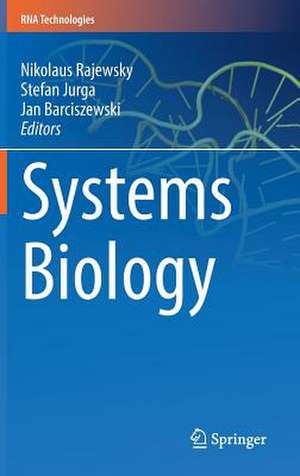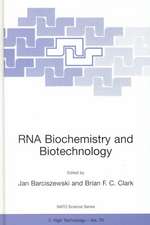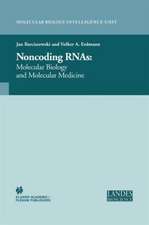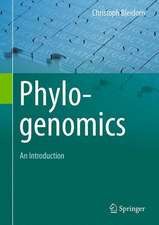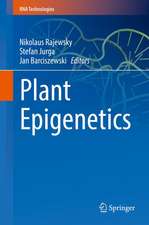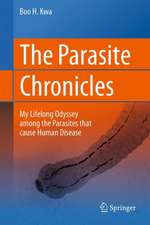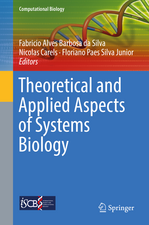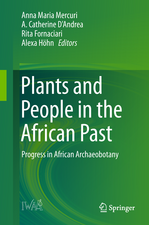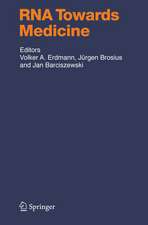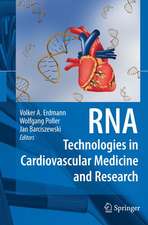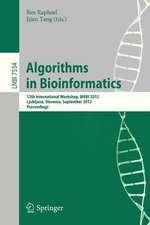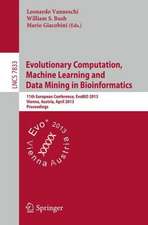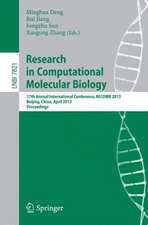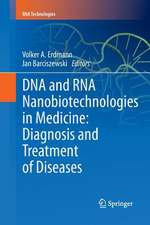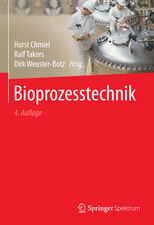Systems Biology: RNA Technologies
Editat de Nikolaus Rajewsky, Stefan Jurga, Jan Barciszewskien Limba Engleză Hardback – 12 sep 2018
Topics covered in this book include fundamentals of modelling networks, circuits and pathways, spatial and multi cellular systems, image-driven systems biology, evolution, noise and decision-making in single cells, systems biology of disease and immunology, and personalized medicine. Special attention is paid to epigenomics, in particular environmental conditions that impact genetic background. The breadth of exciting new data towards discovering fundamental principles and direct applicationof epigenetics in agriculture is also described.
The chapter “Deciphering the Universe of RNA Structures and Trans RNA-RNA Interactions of Transcriptomes in vivo - from Experimental Protocols to Computational Analyses” is available open access under a CC BY 4.0 license via link.springer.com.
The chapter “Deciphering the Universe of RNA Structures and Trans RNA-RNA Interactions of Transcriptomes in vivo - from Experimental Protocols to Computational Analyses” is available open access under a CC BY 4.0 license via link.springer.com.
| Toate formatele și edițiile | Preț | Express |
|---|---|---|
| Paperback (1) | 843.73 lei 38-44 zile | |
| Springer International Publishing – 13 dec 2018 | 843.73 lei 38-44 zile | |
| Hardback (1) | 1010.65 lei 6-8 săpt. | |
| Springer International Publishing – 12 sep 2018 | 1010.65 lei 6-8 săpt. |
Preț: 1010.65 lei
Preț vechi: 1232.50 lei
-18% Nou
Puncte Express: 1516
Preț estimativ în valută:
193.41€ • 201.18$ • 159.67£
193.41€ • 201.18$ • 159.67£
Carte tipărită la comandă
Livrare economică 14-28 aprilie
Preluare comenzi: 021 569.72.76
Specificații
ISBN-13: 9783319929668
ISBN-10: 3319929666
Pagini: 318
Ilustrații: X, 401 p. 60 illus., 46 illus. in color.
Dimensiuni: 155 x 235 mm
Greutate: 0.75 kg
Ediția:1st ed. 2018
Editura: Springer International Publishing
Colecția Springer
Seria RNA Technologies
Locul publicării:Cham, Switzerland
ISBN-10: 3319929666
Pagini: 318
Ilustrații: X, 401 p. 60 illus., 46 illus. in color.
Dimensiuni: 155 x 235 mm
Greutate: 0.75 kg
Ediția:1st ed. 2018
Editura: Springer International Publishing
Colecția Springer
Seria RNA Technologies
Locul publicării:Cham, Switzerland
Cuprins
Chapter 1: Systems Biology of Genome Structure and Dynamics.- Chapter 2: A Systems Perspective of Complex Diseases: from Reductionism to Integration.- Chapter 3: Systems Biology of Bacterial Immune Systems: Regulation of Restriction-Modification and CRISPR-Cas Systems.- Chapter 4: Systems Biology of RNA Binding Proteins in Amyotrophic Lateral Sclerosis.- Chapter 5: Systems Approaches to Map in vivo RNA-Protein Interactions in Arabidopsis thaliana.- Chapter 6: Systems-Level Analysis of Bacterial Regulatory Small RNA Networks.- Chapter 7: Epioncogenes in Cancer—Identification of Transcriptomic and Epigenomic Cooperation Networks by Multi-Omics Integration of RNA-Seq and ChIP-Seqdata.- Chapter 8: Coupling Large Scale –Omics Data for Deciphering Systems Complexity.- Chapter 9: Deciphering the Universe of RNA Structures and tTans RNA-RNA Interactions of Transcriptomes in vivo | from Experimental Protocols to Computational Analyses.- Chapter 10: Is Autogenous Post-Transcriptional Gene Regulation Common?.- Chapter 11: The Interplay of Non-Coding RNAs and X Chromosome Inactivation in Human Disease.- Chapter 12: Novel Insights of the Gene Translational Dynamic and Complex Revealed by Ribosome Profiling.- Chapter 13: Biophysical Analysis of MiRNA-Dependent Gene Regulation.- Chapter 14: Modeling and Analyzing the Flow of Molecular Machines in Gene Expression.- Chapter 15: Robust Approaches to Generating Reliable Predictive Models in Systems Biology.- Chapter 16: Hints from Information Theory for Analyzing Dynamic & High Dimensional Biological Data.- Chapter 17: Enhancing Metabolic Models with Genome-Scale Experimental Data.- Chapter 18: An Integrative MuSiCO Algorithm: from the Patient-Specific Transcriptional Profiles to Novel Checkpoints in Disease Pathobiology.- Chapter 19: Nanocellulose: a New Multifunctional Tool for RNA System Biology Research.
Notă biografică
Prof. Dr. Nikolaus Rajewsky,
Berlin Inst. for Medical Systems Biology,
MaxDelbrückCenter for Molecular Medicine,
Berlin-Buch,
Germany
rajewsky@mdc-berlin.de
Prof. Dr. Stefan Jurga,
Adam Mickiewicz University,
Nanobiomedical Center,
Poznań,
Poland
stjurga@amu.edu.pl
Prof. Dr. Jan Barciszewski,
Polish Academy of Sciences,
Institute of Bioorganic Chemistry,
Poznań,
Poland
jan.barciszewski@ibch.poznan.pl
Textul de pe ultima copertă
Many breakthroughs in experimental devices, advanced software, as well as analytical methods for systems biology development have helped shape the way we study DNA, RNA and proteins, on the genomic, transcriptional, translational and posttranslational level. This book highlights the comprehensive topics that encompass systems biology with enormous progress in the development of genome sequencing, proteomic and metabolomic methods in designing and understanding biological systems.
Topics covered in this book include fundamentals of modelling networks, circuits and pathways, spatial and multi cellular systems, image-driven systems biology, evolution, noise and decision-making in single cells, systems biology of disease and immunology, and personalized medicine. Special attention is paid to epigenomics, in particular environmental conditions that impact genetic background. The breadth of exciting new data towards discovering fundamental principles and direct applicationof epigenetics in agriculture is also described.
The chapter “Deciphering the Universe of RNA Structures and Trans RNA-RNA Interactions of Transcriptomes in vivo - from Experimental Protocols to Computational Analyses” is available open access under a CC BY 4.0 license via link.springer.com.
The chapter “Deciphering the Universe of RNA Structures and Trans RNA-RNA Interactions of Transcriptomes in vivo - from Experimental Protocols to Computational Analyses” is available open access under a CC BY 4.0 license via link.springer.com.
Caracteristici
Presents a wide spectrum of topics from fundamentals of modelling networks, to image-driven systems biology and personalized medicine Combines fundamentals with clinical and agricultural applications With a special topic on epigenetics in agriculture
